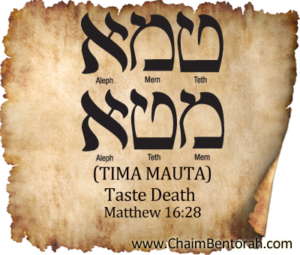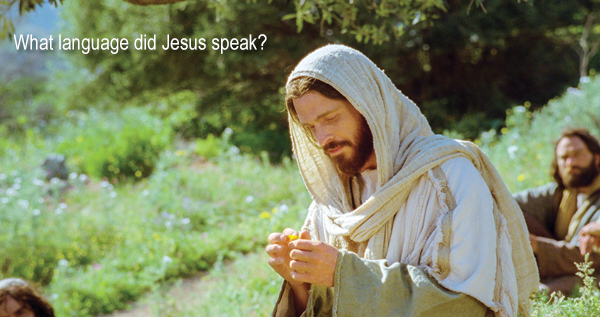Aramaic Word Study – Taste Death – Tima Mauta Teth Mem Aleph Mem Teth Aleph
Matthew 16:28: “Verily I say unto you, There be some standing here, which shall not taste of death, till they see the Son of man coming in his kingdom.”
 Reading this on a surface level can be very confusing. This appears to be talking about the second coming of Jesus but it is saying that there are some who are present with Jesus that will not die before his second coming. Well, what it really says is that they will not taste death. That is dying, isn’t it?
Reading this on a surface level can be very confusing. This appears to be talking about the second coming of Jesus but it is saying that there are some who are present with Jesus that will not die before his second coming. Well, what it really says is that they will not taste death. That is dying, isn’t it?
Commentators have struggled with this passage and generally conclude that Jesus only meant that they will see certain elements of the Son of Man coming into His kingdom, ie., the resurrection, the transfiguration, and the ascension into heaven. Bless their hearts, they really try to protect God’s Word. But, let’s face it, Jesus didn’t say that they would see a portion or a bit of the kingdom, He clearly meant the entire kingdom.
Others will look at the words taste of death and rightly conclude that it was a first-century idiomatic expression meaning one’s legacy. This could very well be true as the memory and legacy of the disciples are still with us today after 2,000 years and will continue to be known until Jesus returns. I have very little problem with that explanation as it seems to suggest that once Jesus returns with His kingdom then their legacy will end. I say a little problem because it would stand to reason that once Jesus returns the message of the disciples, hence their legacy will no longer have relevancy as the world that we know it will no longer exist, and the message of the disciples will have reached its fulfillment.
But let us look closer at these words taste of death. In Greek, the words are geusontai thanatou . Geusontai means to taste, experience, or partake. Thanatou is a separation of the soul from the body, it could be either spiritual or physical death. This could not be spiritual death as it is a reference to the disciples who would not die spiritually (or as we understand go to hell) once their soul is separated from their body. So it can only be a reference to physical death.
Jesus spoke these words in Aramaic and the Aramaic seems to shed some light on this passage. The Aramaic word for taste is taim. I searched through Jewish literature and found in the Targum some first-century understanding of this word taim. I found the word is actually used to express the value of what is eaten. There was an understanding in that day that certain foods were more healthy than other foods. Even in the day of Daniel certain foods were fed to Daniel and his friends because they were believed to create better health. When Daniel and his friends insisted on eating only kosher food the attendant was concerned that he would be put to death if he feed them something that left them looking very unhealthy. Once he discovered the taim or value of the kosher food, he fed it to everyone.
Thus, Jesus was saying “Verily I say unto you, There be some standing here, those who shall not see the value of death, till they see the Son of man coming in his kingdom.” Indeed, the disciples at the time of their death probably did not fully understand the value of the coming kingdom of God. Once after death time no longer exists. “One day with the Lord is as a thousand years” – II Peter 3:8. Once the disciples entered heaven, and stepped into that dimension where time no longer exists they saw the value of the Son of Man coming into His kingdom. In other words, they willingly gave up their lives for the sake of Jesus and the Gospel of the coming kingdom but it would not be until after they died would they realize the actual value of what they gave their lives up for.
Maybe we can put it another way. We fear death but will willingly go beyond our fear of death when we give our lives up for the sake of Jesus. It is not until after we die and enter the kingdom of God that we wonder why we so feared death. Some people cling to life hoping to never die when all along death is our doorway to something even greater and better. Thus some will not taste – taim – value death until they see the Son of man coming into his kingdom.
The Talmud teaches that a man can tell another person who has never eaten meat what meat taste like. He could use every possible description but until that person actually tastes meat himself, will he really fully understand what meat tastes like? The many martyrs throughout history only had an idea of what they were dying for but after they died did they really understand the full value of what they gave their lives for.
The word for death is mauta which, like the Greek, can mean either spiritual or Quphysical death. Possibly we can explain it another way if you hold to the theory that the kingdom of God belongs to those who accept Jesus as their Savior. Thus, until we die to ourselves, our fleshly, selfish earthly desires, and embrace the spiritual life offered by Jesus will we see the taim or the true value of the Son of man coming in His Kingdom of God.
Hi there! Thank you for reading this Daily Word Study. Can I ask a favor? Share this Daily Word Study with your friends on Facebook and Twitter by clicking one of the icons below.
Thanks & Blessings, it means a lot to me!








This is a critical clarification.
Really difficult to explain to a person focused on finding fault with Jesus.
Thank you
Romans 14:17 “for the kingdom of God is not meat and drink; but righteousness, and peace, and joy in the Holy Ghost.”
Luke 17:21 “neither shall they say, Lo here! or, lo there! for, behold, the kingdom of God is within you.”
I was thinking about a certain sect that does not believe in The Holy Spirit and they talk much about a coming physical kingdom. Their theology doesn’t quite match up to scripture.
In remembering the 2 verses above, it came to mind that the Kingdom of God comes unto us before physical death. So I understood your study scripture to say;
Jesus was referring to “some (Disciples) standing there would not taste death (suffering) till (after the New Birth) they see the Son of man coming in his kingdom?
Up until then, none of them knew what it was to be persecuted and martyred for Christ.
The one benefactor crucified next to Jesus asked if Jesus could remember him when He came into His Kingdom and Jesus told him “Today you’ll be with me in Paradise” signifying the New Birth.
What a great scripture to wrestle with regarding the Kingdom of God. Something I’ve found is that His Kingdom is the worlds equivalence of self actualization.
See. Jesus Kingdom is present. It’s at hand and I think we can miss it if we don’t understand Revelation 7 and how it correlates with Matthew 6/the fact that He has wiped our tears away even though the pain is still present (Revelation 21:4).
The 7 seals are open and Jesus reigns and is going to destroy all those who destroy the earth. Which is why He’s not going to come back until the “man” is out of the way/His people do not incrue the same judgement as the the tares.
His Kingdom is ready and waiting and it takes us all United and purpose to see not just the baptism of the Holy Spirit ie John 20:22, but His full presence and power as seen in acts 2.
The reality I’ve found is that the Holy Spirit is 2 parts found in Matthew 3:11 and we really have yet to see the fullness of what’s possible because of the deception/revelation 18:24. of This way of life that seems right but really leads to death/sin because the head of the serpent was bruised but we find how in revelation 13 the mortal wound was healed.
Even though the first century church were “virgins” to this judgement pointed out in 1st Peter 4:17 and highlighted in Revelation 17:1 there will be those who will be too good for even death when Jesus returns.
Looking forward to things as we are being called out of Babylon/Lilith. To work with our hands and need nothing from nobody which is much easier as a united body and will happen because Jesus said it.